#catechism lmaoo and that was half by accident
Note
Hey Cardinal, you ve talked a little bit about Crassus tending to open his house to all levels of society and his treatment of his domestic staff and slaves, and I would love to hear more of your thoughts about it?
OH BOY. Okay. So I had to think about this one for two months, because the first attempt to answer this resulted in about ten pages of writing and that’s. arguably too much. I’ve attempted to condense my thoughts down here as much as possible, but. we’ll see how it goes! somehow this is still over a thousand words!
Gonna start this off by tacking this at the top of it.
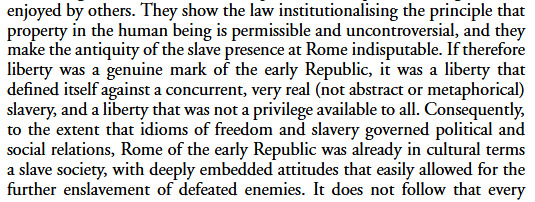
The Cambridge World History of Slavery, Volume 1: The Ancient Mediterranean World, ed. Keith Bradley and Paul Cartledge
To follow that up though, there was no cohesive slave identity shared across the broad scope of people who were slaves in ancient rome, because the lived experiences of each group (agricultural, domestic, freedmen/women, gladiatorial, etc) were so different (for example, freedmen could go on to own slaves themselves, slaves in the mines and working in rural agricultural conditions were the least likely to have a shot at gaining freedom because that would be a loss of income for the roman that owned them, etc) that to associate it all as a uniform identity-experience is also Not Good.
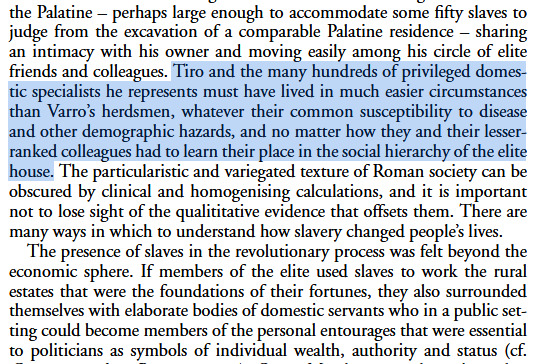


(ibid)
ANYWAY. So my focus on Crassus here has three sides to it.
for the sake of simplicity, we will be using The Cambridge World History of Slavery, Volume 1: The Ancient Mediterranean World, ed. Keith Bradley and Paul Cartledge (unless otherwise cited), at the end, I'll tack on some other reading outside of the body of text that I've written.
The most immediate side is that I’m interested in the lives of slaves in the Late Republic, but in a broader scope than the handful of individuals who have historical prominence, you know? Slaves and freedmen occupied a unique social space in the Late Republic, and had a political-social prominence, and I’m curious about which politicians recognized them as a block worth paying attention to. I want to see what they have to say in the absence of a voice.
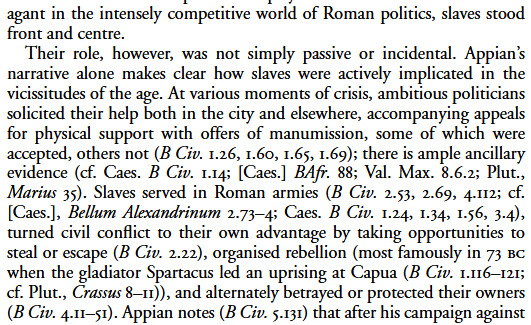
you can see that the potential social flexibility of the slave was a problem for the Augustan Age/Early Empire by laws that were passed to curtail this, which in turns says something about their role in Late Republic life and society.
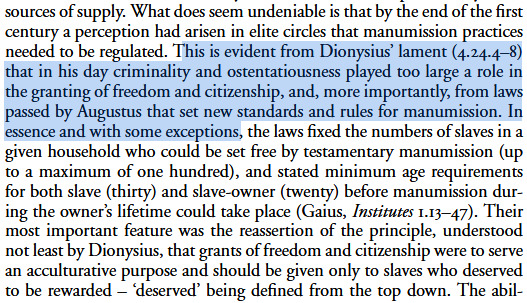
So, slaves are an extension of the house they belong to, which is a deeply simplified understanding of all of this so bear with me a little! There’s a social contract, so to speak, that when granted freedom, the (now) freedman has a patron-client relationship with his former owner, who has an obligation to maintain this dynamic.
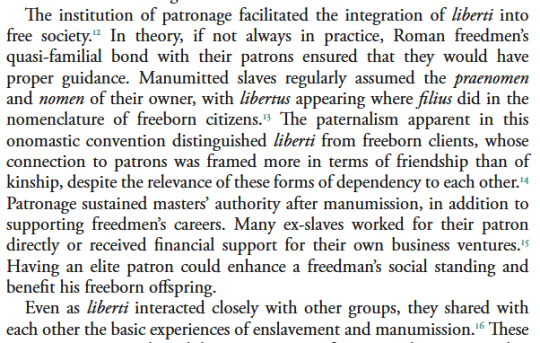
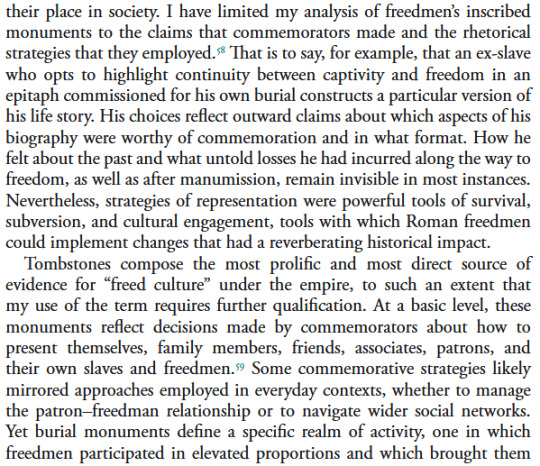
Freed Slaves and Roman Imperial Culture, Rose MacLean
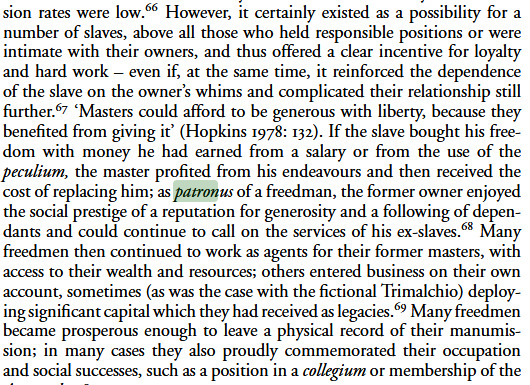
ALRIGHT. We’re getting to the point where this involves Crassus, hang on.
So Crassus in Plutarch’s bio sounds off that he’s got a lot of slaves, and a lot of mines, but the ones of most value are his slaves in Rome specifically, because they were trained (some personally, by Crassus himself) and skilled in high demand areas, and were sought after. Aside from the obvious, the part that strikes me as interesting is that this is not. an insignificant number. Plutarch says five hundred. That’s a recognizable amount of people in Rome who have a certain amount of social flexibility (the slaves of upper class or political heavy weights had less in common with the urban poor, and frequently interact with other houses of political influence) and all of those people are attached to Crassus.
This would extend even further to any of them who gained their freedom, because that would continue over into a patron-client relationship, and those five hundred slaves mentioned by Plutarch are all in a group that are the most likely to have a chance at buying their freedom. Whether or not this was the case is a huge Who Knows! because Plutarch skips over huge chunks of Crassus' life to get to the political machinations of conspiracy.


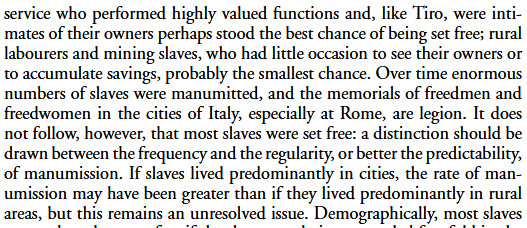
Less abstractly and more straightforwardly: Crassus and Clodius were well aware of the political-violence potential of slaves

Roman Freedmen in the Late Republic, Susan Treggiari
This contrasts heavily against, say, Pompey, who has several named slaves/freedmen in his biography that indicate levels of a personal relationship or friendship (we cannot use the mentions of individuals in Pompey's biography to assume that he was inclined to giving his own slaves freedom), and Caesar himself seems to have been even more insular than Pompey in this.

Roman Freedmen in the Late Republic, Susan Treggiari
There’s an underlying thing happening, though, later in Pompey’s life: Pompey (and Caesar) later rival Crassus in terms of wealth, but the difference has to do with location, land distribution, and slaves. Crassus seems to have most of his wealth concentrated in or near Rome (slaves, architecture, renting properties, the fire brigade, etc) with less of a focus on agriculture-mines for an income and more on. this. I'm still going through a couple of books for more on this vague train of thought, but its. something to think about.
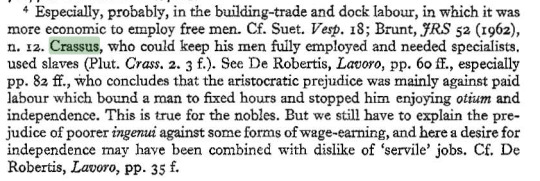

Roman Freedmen in the Late Republic, Susan Treggiari
Pompey and Caesar seemed to follow the trend the rest of their military-senatorial contemopraries were following, which. would have inadvertently led to a worsening economic disparity in Rome (the urban poor + displaced farmers being driven off their land and forced to go to Rome for work because the influx of slaves from military conquests was a source of income that slave owners would have hated to give up)

there’s. some kind of additional thought in here about the crucifixion of the six thousand as a display of power and a threat to anyone else who was thinking of revolting against rome. Crassus seemed to have forgone the idea of taking anyone after the battle as a slave and opted for total annihilation, which falls in line with how he could be a ruthless motherfucker when it came to establishing order and did not apparently view this as an economic opportunity.
which moves on to my second thing about Crassus, I think that part of why he had his house open to people across different social classes and wasn’t prone to lavish displays of whatever had to do with how he grew up. I also think that it ties back to Crassus honing in on groups of people and realizing that they had political importance in some way. Plutarch’s bio makes note that he spent time advocating on behalf of anyone who needed it, even on cases that Caesar wouldn’t touch. That is an absolutely KILLER way to build up your reputation in a way where you would not necessarily need to traditionally align yourself with either of the two major political parties, and would lend you a lot of good will with groups of people who are not given voices in historical accounts. An absence of voice does not mean an absence of body!
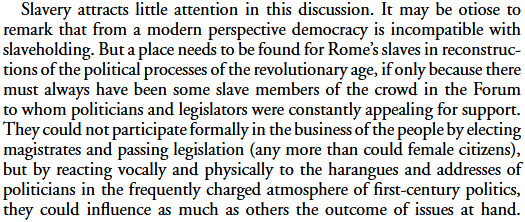
Which ties into the third thing, Crassus occupies a third space in politics. Crassus specifically appears to drift around without much harm done to his reputation where it counts (Cicero gives him shit for it, but he still managed to get out of several sticky situations mostly unscathed) (Crassus’ appearances in other biographies indicate someone who is not firmly aligned one way or another politically as well, which is fascinating for other reasons).
I think generally, Crassus had his finger to the pulse of the many beating hearts of Rome's groups and understood on some level, the potential power of each one.
Those are my thoughts! also I’m going back in time to the Augustan Age and putting thumbtacks into all of Octavian’s shoes!

ADDITIONAL READING

Freed Slaves and Roman Imperial Culture, Rose MacLean


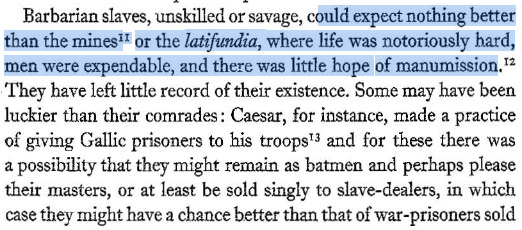

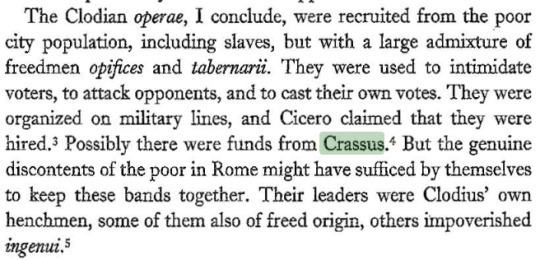
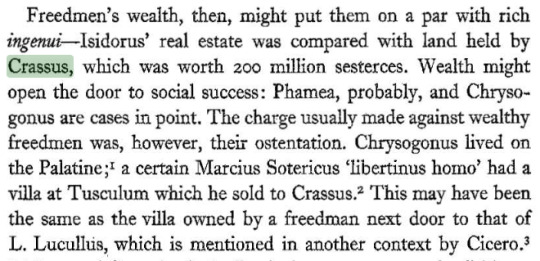

Roman Freedmen in the Late Republic, Susan Treggiari
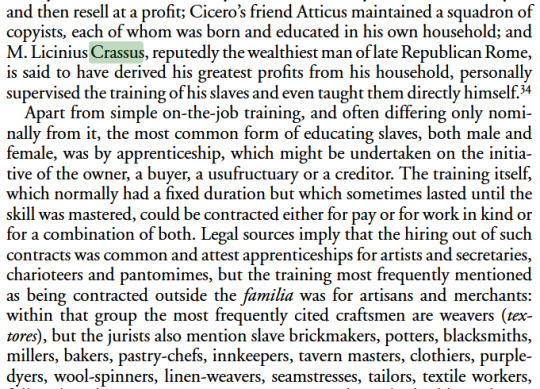
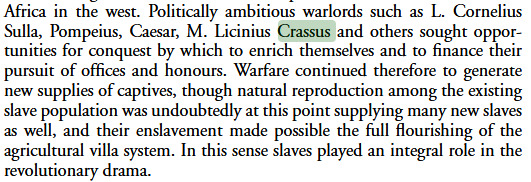
The Cambridge World History of Slavery, Volume 1: The Ancient Mediterranean World, ed. Keith Bradley and Paul Cartledge
my point of contention with the last one is that Crassus didn't go on enough military campaigns to rival the other men in this group for it to be an even comparison, especially since he had an opportunity with the Spartacus Revolt and executed six thousand people instead.
#ask tag#long post#good grief is it long#hopefully any of it makes sense. im an artist. i draw comics. the only thing ive taught as an instructor in a classroom was catholic#catechism lmaoo and that was half by accident#book club tag#tris homines
26 notes
·
View notes